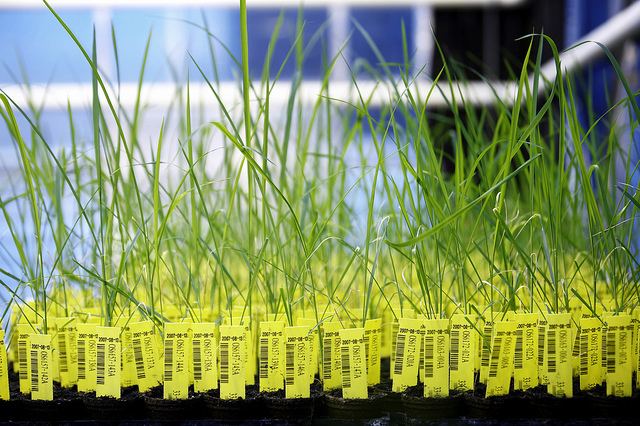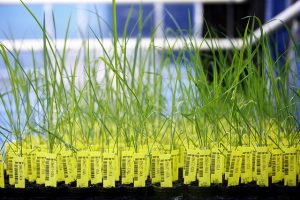

Endorsing Genetically Modified Organisms in Nigeria: Matters Arising
FeaturedNews October 24, 2018 Dianabasi Effiong


Each genetically modified rice plant in the greenhouses at CropDesign has a barcode and transponder, allowing it to be accurately identified at any time. The rice plants ripen in the greenhouse until they are harvested some of them under ideal conditions. Others are subjected to various stress situations, such as a high salt concentration in the soil or severe drought. Researchers monitor the development of all the plants: they are photographed and measured at regular intervals. The resulting data provide information about the characteristics of the plants and thus about the transported genes. Belgian biotechnology company CropDesign develops traits¹ for the global seed market. A trait is a genetic feature that gives a crop an economically useful characteristic, such as higher yield. Traits are determined by a plant¹s genes. Print free of charge. Copyright by BASF.
By Dianabasi Effiong
Participants at the 3rd South-West Agro-ecological Biosafety Workshop, recently concluded in Osun state reportedly endorsed the use of Genetically Modified Organisms (GMOs) in the agriculture sector to boost food security in Nigeria.
Their conclusions raised eyebrows in quarters conversant with GMOs and their impacts globally.
Concerns raised included the safety of a system line genetic engineering that produces novel organisms, thrive on toxic herbicides some of which are more or less pesticides as compared to an agricultural system that works with Nature.
According to reports, the workshop, which held at the Obafemi Awolowo University (OAU), Ile Ife, has participants from universities and research institutes.
A follow up statement by Dr Rose Gidado, an Assistant Director, National Biotechnology Development Agency (NABDA), in Abuja also noted that the Nigeria Academy of Science, had earlier endorsed GMOs.
She stated: “The endorsement came a year after the country’s topmost scientific body, the Nigeria Academy of Science equally urged government to roll out the technology in all areas to ensure Nigeria benefit maximally from it.’’
Gidado, also the Country Coordinator, Open Forum on Agricultural Biotechnology (OFAB), said the scientists reasoned that although government action was belated, it was better now than never.
According to her technology remains one of the most viable options for the country to enhance its food security strategies and provide healthy food for its growing population.
“Professors in various aspects of biosciences were of the view that government in its wisdom has set in motion all the necessary machinery needed to enable the technology take effective root in the country.
“This it did by establishing the National Biotechnology Development Agency (NABDA) as the promoter of the technology over 15 years ago, and the National Biosafety Management Agency (NBMA) as the regulatory body in the last three years.’’
According to Prof. Eyitope Ogunbodede, the Vice Chancellor, OAU, government economic diversification plan to reposition agriculture as the main stay of the economy will be achieved if conventional agriculture gives way to modern tools such as biotechnology.
He also stated that conventional agriculture led to food insecurity, hunger, malnutrition and poverty in Nigeria.
“As the debate on the use of biotechnology for food production continues in the country, opportunity must be given to scientists and scientific evidence to prove that GM foods are safe as any other food from conventional sources.’’
Ogunbodede said that with the National Biosafety Policy in place, the legal framework had been established for the safe and responsible application of modern biotechnology in the country.
Also Prof. Bamidele Solomon of the Chemical Engineering Department, OAU, and Chairman, Ife Biotechnology Group, listed some of the challenges of food security.
“The challenges include climate change, persisting pest infestations, declining soil nutritional quality, gradual reduction in arable land use due to the pressures of urbanisation.
“But modern biotechnology has been identified as an important tool that can help countries like Nigeria achieve food security and food sufficiency, industrial growth, health improvement and environmental sustainability.
“Modern biotechnology is a technique used for genetic improvements that is more efficient and precise compared to conventional breeding,’’ he said.
Similarly, Prof. Durotoluwa Oyedele, Dean, Faculty of Agriculture, OAU, said that biotechnology could potentially increase agricultural productivity, enhance food security, move agriculture away from dependence on chemical inputs and reduce environmental problems.
He added that it is important that we realise that food security and agricultural productivity depend largely on domestication of biotechnology.
Dr Babatunde Ogundare, the Deputy Dean, Faculty of Science, OAU, said Nigeria must step out of the political campaign involving GMOs and focus more on scientific information backed by evidence.
“We are currently faced with issues of hunger and food insecurity, therefore all hands must be on deck to think of the most appropriate strategy that will make safe and healthy food available to all Nigerians.
“Food is the only thing left for the common man, it must not be contaminated, and it must be free,’’ he said.
However, Mr Nnimmo Bassey, an environmentalist, who is also Director, Health of Mother Earth Foundation, a Nongovernmental Organisation, disagreed with such endorsement.
Speaking in an interview Bassey said that genetic engineering has a diversity of applications beside food and agriculture.
He said: “If people gathered under the umbrella of agroecology and claimed to support genetic engineering in agriculture, the only conclusion that can be drawn is that the label of agroecology was a smokescreen aimed at deceiving participants.
“It is impossible for anyone professing an agricultural system that works with Nature to support a system line genetic engineering that produces novel organisms, thrive on toxic herbicides and some of which are more or less pesticides.’’
Drawing from Burkina Faso experience, Bassey said that the West African country had a disastrous experience with genetically modified cotton (Known as Bt cotton) which gave very poor yields and farmers faced huge losses.
“This same cotton which was abandoned in Burkina Faso in 2016 was the same one NBMA approved for commercial release that same year.
“GMOs are accompanied by a cocktail of chemicals. These chemicals which are produced by same GM seed companies are highly toxic and linked to serious health defects, he warned.
Bassey said: “Weeds and pests are fast becoming resistant to the chemicals thus increasing the need for even more toxic and harmful concentrations of those chemicals to control them’’.
He said that non-target organisms get destroyed in the process, adding that the impacts of GMOs on our health, environment and economy go beyond this present generation.
“GMOs once released cannot be recalled and we lack capacity to manage the impacts. It is not just about now, it is about tomorrow. It is not just about Nigeria but it is about Africa.’’
According to him, NABDA was wrongly set up to promote GMOs before Nigeria had a biosafety law in place.
He also alleged that the agency “is working strenuously to make it impossible for proper regulation of biosafety in Nigeria’’.
The environmentalist said that genetic engineering has a diversity of applications beside food and agriculture.
“It is unfortunate that this agency (NABDA) has taken it upon itself to promote a harmful food system and peddling information that cannot be substantiated in the face of mounting evidence otherwise.
“GM crops are mostly engineered to withstand toxic herbicides such as Roundup made by Monsanto (now Bayer).
“A gardener in the USA was recently awarded $298million for exposure to this herbicide that made him suffer from cancer.
“In fact, reports have it that there are up to 4000 cases pending against the toxic herbicide which is freely imported into the country and more of which will be brought in following the flood of GMOs being permitted here.
“NABDA should know that the fact that they are a government agency doesn’t mean that Nigerians must be taken for a ride. We need science that is responsible and responsive,’’ Bassey said.
He said that although there was a statement by the Nigerian Academy of Sciences endorsing GMOs, it was a highly misguided statement to come from such a respected body.
According to him even a lay man on the street knows that if GMOs had no downside there would be no need for regulations.
He said: “There would be no need for risk assessment for every application. There would be no need for liability clauses in the law.
“In fact, if GMOs were 100% safe, the biosafety law would not be predicated on the Precautionary Principle of the Cartagena Protocol.
“Even the Academy of Sciences of the USA doesn’t make such an unguarded blanket claim as the one made by the Nigerian Academy of Sciences.
“There is no need for us to respond to every claim made by the mouthpiece of NABDA and the official NGO that domiciles in her office.
“Suffice to say that the GMO she goes around promoting is a failed and fading technology and Nigeria is merely a route through which African agriculture will be contaminated and our people will once more be colonised this time though food.
“The world is gearing up to face the challenge of extreme genetic engineering such as synthetic biology and gene drives – technologies that will displace livelihoods, cause extinctions and claim that artificial organisms are natural.
“We cannot in all conscience fold our arms and watch persons in government offices propagate technologies that has impoverished farmers, driven many to suicide as in India and failed woefully in Burkina Faso, our neighbouring country.’’
He urged that in this election season politicians should assure Nigerians on whose side they stand.
“Will they support the small scale farmers, they are feeding us through safe food production or are they contesting elections so as to support a subversive agricultural system?
“Does the Nigerian president know that our markets are scandalously flooded with GMO products with no assurance of their safety? ,’’ he said.






